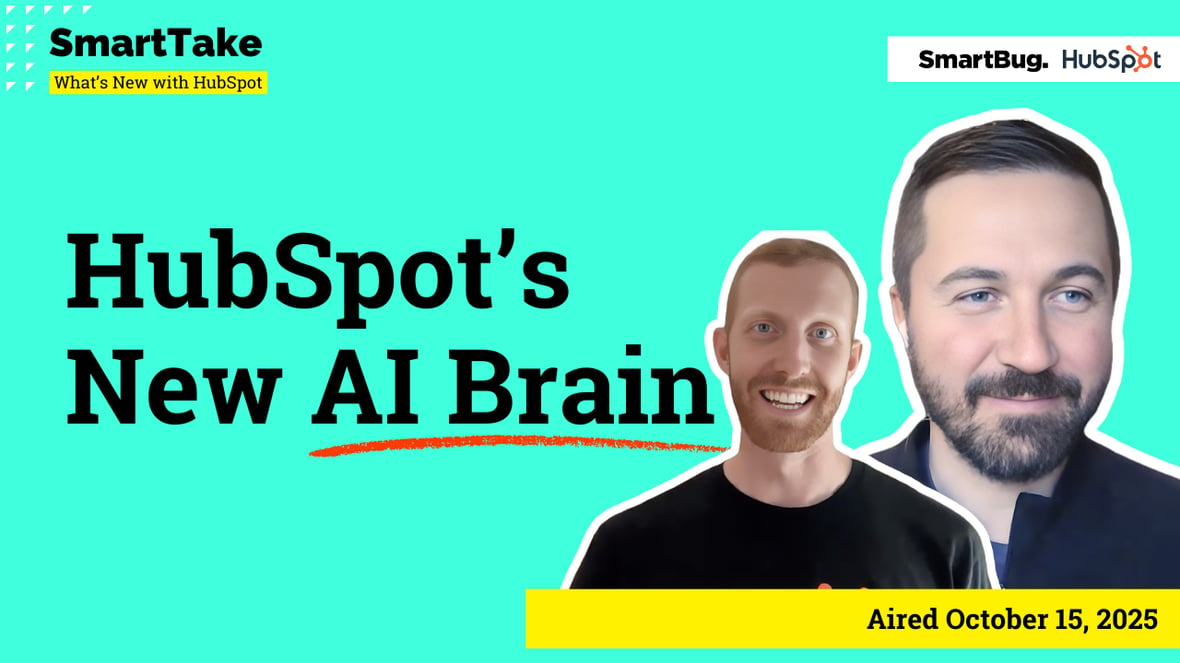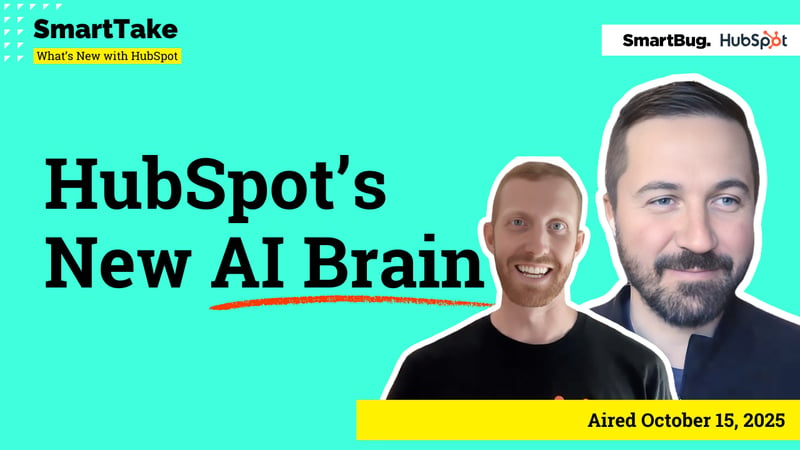
5 Takeaways from October's SmartTake: Our HubSpot Product Recap
October 27, 2025
If you're a HubSpot user, you know the feeling: Another month, another dozen HubSpot product updates.
Missing critical updates means falling behind competitors and not leveraging your full HubSpot investment. But who has the hours to watch every product announcement? And which ones actually matter for your day-to-day work?
That's why we created SmartTake, SmartBug's monthly series that curates the most essential HubSpot updates. Every month, Paul Schmidt, VP of Marketing & Innovation at SmartBug, and Brian Wettach, Strategic Partner Development Manager at HubSpot, filter out the top features and show you exactly how to use them. This recap focuses on the five game-changing releases from our October 2025 session, which covered HubSpot's September 2025 updates.
Here are the top five takeaways:
- Marketing Hub: AI referral tracking for deep traffic insights.
- Content Hub: Custom AI landing pages for fast, branded content.
- Sales Hub: Deal Loss Agent to turn setbacks into strategy.
- Data Hub: Data Agent for automated customer intelligence.
Continue reading, or scroll down to watch these updates instead.
Takeaway 1: Marketing Hub Tracks AI Referrals for Deeper Traffic Insights
HubSpot has included AI as a referral source in website traffic analytics. Previously, traffic coming from large language models (LLMs) such as ChatGPT, Claude, and Perplexity was often lumped into a generic "other" category. Now, HubSpot categorizes LLM traffic as a distinct referral source, providing the visibility you need.
The update is now available in standard website traffic analytics tools.
Why This Matters for Marketers
Here is the key insight: Traffic generated by AI tends to convert at a significantly higher rate compared to traditional channels, such as organic or direct traffic. This is revenue-impacting data, not just a vanity metric.
If you are seeing your organic traffic numbers dip, this update can explain where that audience is going. It proves the ROI of your answer engine optimization (AEO) efforts and helps you justify budget allocation toward AI-optimized content by clearly showing the evolving customer search behavior. This feature helps marketers understand how AI-driven platforms are sending traffic and how to optimize content for discovery through AI assistants.
Practical Applications for Your HubSpot Product Strategy
Paul outlined three immediate, practical use cases for this new data:
- Reporting and monitoring: Track AI traffic growth month over month. Include this data in executive dashboards to demonstrate the importance of this emerging channel and compare AI conversion rates against organic or paid channels.
- List building and segmentation: Create smart lists of contacts who found you via LLMs. Segment these high-intent prospects for targeted nurture campaigns and build separate workflows designed for AI-sourced leads.
- Lead scoring enhancement: Because AI referral traffic converts at a higher rate, incorporate it into your lead scoring calculation. Assign higher point values to the AI referral source to ensure sales prioritizes these leads.
Getting Started with Answer Engine Optimization (AEO)
Tracking AI referrals is the start; optimizing for them is the next step. Brian mentioned the answer engine optimization (AEO) strategy tool is currently in private beta, so reach out to your customer success manager for potential access.
You can start today using HubSpot’s free AEO Grader. This tool scans your site, creates a strategy map of your content, and provides insights into how you are performing within LLMs.
Action item: Review your current AI referral traffic in HubSpot analytics (Reports → Analytics Tools → Traffic Analytics → Sources). Once those leads are flowing, you can begin leveraging HubSpot Marketing Hub for lead nurturing with targeted, AI-informed campaigns.
Takeaway 2: Content Hub Supercharges Landing Page Creation with Custom AI Templates
How many similar landing pages does your team have to create each month or quarter? Event marketers, account-based marketing teams, and demand gen managers know the pain of repetitive page creation.
The recent update is simple: You can now use AI to build landing pages with your own custom landing page templates. Previously, AI generation was limited to HubSpot's default templates. This new ability to use custom templates is available to Content Hub Pro and Enterprise customers.
Who Benefits Most?
This update is a major efficiency boost for teams that need brand consistency at scale:
- Event marketers: Create similar pages for monthly webinars or regional conferences.
- ABM teams: Build custom landing pages for target accounts using a proven template structure.
- Demand gen teams: Run concurrent campaigns that require the same page structure across different buyer personas.
The update eliminates the dilemma of choosing between speed and brand standards.
A Quick Walkthrough of How It Works
- Select your custom template. Choose your pre-built custom template from the landing page tool.
- Fill out the AI prompt form. Describe what your page is about, the event details, your audience, and visitor goals. You can upload supporting files (e.g., PDFs, bios) to give the AI more context.
- Click "Generate with Breeze." The tool creates the page in about 30 seconds to a minute.
This process gets you about 85 percent of the way there. It does require human review to refine the content and ensure it is fully polished before publishing.
Time savings: If traditional page creation takes 2-4 hours, this process cuts that down to 30-45 minutes of input and refinement. This increase in ROI scales with every additional page you create.
Takeaway 4: Data Hub's Data Agent Automates Customer Intelligence
Think about the time a sales rep spends on manual account research. It could take 30-40 minutes per account to populate CRM notes. Multiply that, and the time sink is massive.
Data Agent is an AI-powered enrichment tool within Data Hub that solves this. It automatically populates "smart properties" in your CRM by searching and combining data from both internal and external sources. Data Agent spans your entire CRM, offering instant insights across marketing, sales, and service data.
Key Use Cases for Sales and Marketing
Use Case 1: Account Research
Data Agent drastically cuts the manual effort for sales reps by automatically surfacing:
- Recent company news and industry trends.
- The competitor landscape and current tech stack.
- Specific pain points mentioned in internal conversations.
Use Case 2: Hyper-Personalization
The unique value is combining data sources. Brian provided a powerful example: A rep mentions on a call that their Marketo contract renews in Q3. Data Agent captures this from the call transcript, updates a smart property, and gives marketing the option to trigger a perfectly timed "Switch to HubSpot" campaign.
How It’s Different from Other Tools
The differentiator is contextual intelligence:
- Clay/Claygent: Clay primarily searches the external web. Data Agent combines external data with your unique internal CRM data.
- ZoomInfo: ZoomInfo provides firmographic data. Data Agent provides firmographics plus conversational insights, such as competitor renewal dates mentioned on sales calls.
How to use it: You can create a smart property with a natural language prompt (e.g., "What are the main pain points or challenges faced by this company?") and select your data sources. You can then manually run a "Smart Fill" (10 cents per fill) or automate the process via a workflow.
Resource: The SmartBug team built a Data Hub agent idea generator. You can input your domain and get 10 custom ideas for third-party data to pull into the tool.
When implementing HubSpot for financial startups, data enrichment like this is essential for scaling quickly.
Takeaway 5: Breeze Studio Unlocks Efficiency with Custom Assistants
If you use custom GPTs, Gems, or Claude projects for personal productivity, you know how powerful these tools can be. The problem is that they live outside your HubSpot ecosystem.
Custom assistants are your own internal GPT-style agents built within Breeze Studio. They allow you to create specialized AI helpers, like building custom GPTs but within HubSpot, using your specific knowledge base, accessed directly in the HubSpot interface.
A Real-World Example
A constant time drain for sales and delivery teams is answering: "Have we worked with a client in this industry or on this type of project before?" Manually searching through the CRM, Google Drive, and internal documents can take nearly an hour per request.
The SmartBug team built a Client Example Finder custom assistant to solve this. A rep simply asks the assistant for relevant examples, and it searches client records and project data to surface them. This simple HubSpot product feature is saving the sales team approximately 10+ hours per week.
Start Building Your Own Assistants
Brian noted that HubSpot uses a Sales Rules assistant to answer internal questions about deal rules, account ownership, and commission structures—knowledge that is often difficult to decipher for new team members.
Ask yourself: What questions does my team answer repeatedly?
- What knowledge is scattered across different internal systems (e.g., knowledge bases, drives)?
- What requires deep, specific institutional knowledge?
Key benefit: Custom assistants are FREE and do not require credits. You can build as many as you need to remove friction from AI adoption.
You can get ideas by exploring more client success stories from SmartBug Media and thinking about what facts your teams always need to recall.
Stay Ahead of the Curve: Join Our Next HubSpot Product Recap
These five updates are just the tip of the iceberg. HubSpot releases new features constantly.
The SmartTake series is your shortcut to staying informed without the overwhelm. You get expert curation, live demos, and strategic applications from Paul and Brian.
Don't miss the next edition! Register for the November 12 SmartTake episode here.
To recap this month's top five HubSpot product updates:
- Marketing Hub: Track high-converting AI referral traffic.
- Content Hub: Create branded landing pages 90 percent faster.
- Sales Hub: Turn lost deals into coaching opportunities.
- Data Hub: Enrich records with contextual intelligence.
- Breeze Studio: Build custom AI helpers that save hours daily.
Mastering HubSpot isn't about knowing every feature. It's about leveraging the right features for your goals.
Browse past SmartTake recordings here.
About the author
Hannah Watson is a Marketing Strategist with nearly a decade of experience in the field. Having previously served at HubSpot and holding the title of HubSpot Certified Trainer, she specializes in marketing automation. Hannah is passionate about leveraging her expertise to drive growth and achieve outstanding results for her clients. After work, she enjoys time with her outgoing toddler and finds joy in her role as a personal trainer, embracing all things fitness. Read more articles by Hannah Watson.








